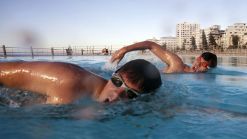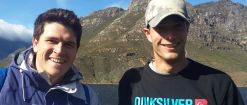
A Mad Swim from Mozambique to Madagascar
The shortest distance between Mozambique and Madagascar is about 500 kilometres – a long way. But not long enough to deter two South Africans from swimming the distance over a month in March, in what will be a world first. No-one has swum this stretch of the Indian Ocean, and no-one has swum this distance […]


The shortest distance between Mozambique and Madagascar is about 500 kilometres – a long way. But not long enough to deter two South Africans from swimming the distance over a month in March, in what will be a world first.
No-one has swum this stretch of the Indian Ocean, and no-one has swum this distance before. It is to be called the Mad Swim, an abbreviation of the Madagascar Swim. They will set off from Nacala, a port town in northern Mozambique, and land south of a small town, Mahajanga, on the west coast of Madagascar.

(Images: Damien Schumann)
Capetonians Thane Williams and Jonno Proudfoot will fight fatigue, sharks and jellyfish on their adventure. They will have a support boat, with a doctor on board, and plan to swim for about six hours each day, averaging 20 kilometres a day.
“The biggest danger is jellyfish, but also the elements: the sun, dehydration and the currents,” says Williams. He explains that inevitably some sea water will be swallowed – this is a concern as it can add to the dehydration.
The men plan to swim for three hours at first light, when the sea is calmest, then again in the afternoon for another three hours.
“I am feeling good at the moment,” says Williams, “the training is going well. I am not worried about the physical side, but I have a bit of nerves, as this has never been done before. I feel more excitement than nerves.”
Proudfoot says he feels “very confident”, and is more concerned about the sponsorship needed for the trip, than the training.
Swimming since school
Williams has been swimming since school, when he represented the Western Cape. He has done triathlons and has represented South Africa as a masters swimmer. Both have done the three-leg Iron Man endurance race three times, and both have swum the 7.5 kilometres from Robben Island to Cape Town, a tough swim in strong currents and the cold Atlantic Ocean.
“I do a lot of open water swimming,” says Williams. In fact, it was after driving back from the Iron Man in East London together that they decided to do “something absolutely epic”, says Proudfoot. They considered swimming Lake Malawi, but then thought the open ocean would be a better challenge.
“Swimming and the ocean have been such a huge part of my life. I’ve been swimming for myself and competitively for over 15 years and it has taken me places and given me great memories, friendships and opportunities,” says Williams.
Proudfoot did water polo at school but “did terribly at school and sport”, otherwise. The two met when they were training for the Robben Island swim. Now, for the Mad Swim, they are training for three hours a day, five days a week. “This will be our swansong,” says Proudfoot.
“I’ve always thought of myself as someone who is very generous and charitable,” he says. But after completing a degree last year, he realised that he had “given almost nothing to a real cause since school”. “My degree was one of the longest, painful and frustrating things I’ve ever done, but the feeling of finishing lit the fire for some more punishment.”
He had to go back to school and pass Grade 12 maths before he could complete his BComm degree, in the process teaching himself accounting, tax and finance, all while managing a large catering company. “I failed a few subjects but never gave up. It took me four years and six months to complete my degree and I worked full time throughout. I lost those years of my twenties to work and studies but I gained the ability and determination to plough through anything to achieve a goal.”
He plans to give talks after the Mad Swim, focusing on the youth, telling them about achieving their potential. He describes himself as “a low-carb chef”, and has collaborated with University of Cape Town sports science professor Tim Noakes, chef and athlete David Grier, and nutritional therapist Sally-Ann Creed, in publishing a cook book called The Real Meal Revolution, with a focus on low-carb, high fat recipes.
Grier is an extraordinary athlete too. He has run the Great Wall of China (4 200km in 93 days), and the entire coastline of South Africa (3 300km in 80 days), paddled from Africa to Madagascar (500km in 12 days), run the length of Madagascar south to north (2 700km in 67 days), and run the entire length of India (4 008km in 93 days). Each event was a fundraising drive, to raise money for his charity, Miles for Smiles, which raises funds for corrective surgery for children born with cleft lips. So far, over 1 000 children have had the surgery. An amount of R5 500 is sufficient for the 45-minute operation.
Williams and Proudfoot, both 29 years old, are also swimming for the Cipla Miles for Smiles initiative. Miles for Smiles challenges extreme sportsmen and women to undertake extreme adventures, awakening in the athletes “the realisation that the journey is bigger than the individual”. Cipla is a pharmaceutical company based in Mumbai, India, that makes drugs to treat cardiovascular disease, arthritis, diabetes, weight control, depression, and other conditions.
“Now it’s time to swim for others. I want to give something back to children. With my passion for the ocean, swimming, adventure, and a touch of madness, I can’t imagine a better way to help make a difference!” says Williams.
Staged swim
It will be a staged swim, which means that GPS co-ordinates are taken when the swimmers climb into the boat, to eat and rest. They will then enter the water again at exactly the same point. A staged swim also requires that they enter the water every day, whatever the weather. If there is a storm, they will have to get in the water and swim, even if they jump in and out of the water periodically.
The swim will be entirely unassisted, with no shark nets, no wetsuits, no cage to swim in, no flippers or breathing apparatus. They will swim in Speedos and goggles. Although the warmer Indian Ocean is not as draining as swimming in the cold Atlantic Ocean, where the body has to fight hypothermia, Williams says that swimming in warmer water can also be tiring, as the body temperature is raised and a swimmer can suffer from heat exhaustion.
They will swim a hundred kilometres a week, the distance they will be swimming while training in January, for three weeks. This will allow them a month of easier swimming and recovery before they begin their epic swim in March. The total distance of the Mad Swim is between 460km and 500km, depending on how strong the currents are.
They expect to be at sea for 35 days, and will swim ashore 200km south-west of Mahajanga in Madagascar, where they will place a South African flag in the sand, before getting in the boat and returning to Mozambique, and eventually Cape Town.
Although the training is going well, the two athletes are concerned about their fundraising for the swim. They still need to raise at least R450 000 for the boat and crew. Miles for Smiles expects athletes to donate to the foundation an equal amount spent on their endeavour. In their case it will be about R500 000. Proudfoot says that for every copy of The Real Meal Revolution sold, R5 goes to Miles for Smiles. He hopes that by the end of the year, 100 000 copies will have been sold. So far, 10 000 books have been sold, since its launch in late 2013.
Proudfoot describes himself as a “low-carb chef”, while Williams runs a frozen food logistics company. They are among several South African extreme sportsmen. In 2009, Riaan Manser paddled 5 000km alone and unassisted around Madagascar, in 11 months. He has also cycled around the edge of Africa, a journey of 37 000km through 34 countries. It took him over two years to complete his solo ride. In 2001, together with Dan Skinstad, he paddled around Iceland, a journey of 2 300km, completed in five months.
By: Lucille Davie
Miles for Smiles: http://www.milesforsmiles.co.za/
Source: www.mediaclubsouthafrica.com
